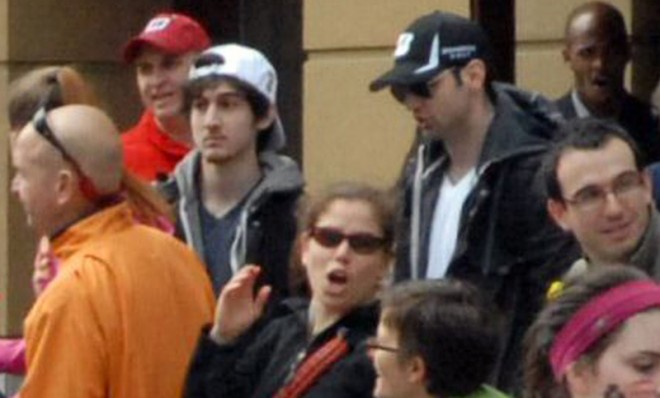Dzhokhar Tsarnaev's pre-Miranda confession: Will it hurt the prosecution's case?
Tsarnaev stopped talking once he was read his Miranda rights. That could create headaches for the prosecution down the road

A free daily email with the biggest news stories of the day – and the best features from TheWeek.com
You are now subscribed
Your newsletter sign-up was successful
From his hospital bed, Dzhokhar Tsarnaev admitted to authorities that his older brother had recruited him to plant two bombs near the finish line of the Boston Marathon, according to The Associated Press. The problem? The confession came before he was read his Miranda rights.
Tsarnaev apparently exercised his right to remain silent after a magistrate judge and a representative from the U.S. Attorney's office came into his room and read him his Miranda rights, an unnamed law enforcement official told the AP.
Now the question is whether everything he said before that will be admissible in court. The admissibility of Tsarnaev's reported confession hinges on the the validity of the public-safety exemption invoked by police. That exemption allows officials to delay someone's Miranda rights when there is a continued threat to public safety — like, say, when you have a terrorist in custody who might be able to tell you about future attacks.
The Week
Escape your echo chamber. Get the facts behind the news, plus analysis from multiple perspectives.

Sign up for The Week's Free Newsletters
From our morning news briefing to a weekly Good News Newsletter, get the best of The Week delivered directly to your inbox.
From our morning news briefing to a weekly Good News Newsletter, get the best of The Week delivered directly to your inbox.
The court will ultimately decide whether Tsarnaev's pre-Miranda confession is admissible, says The Atlantic's Adam Goodman:
The authorities are not constitutionally obligated to Mirandize Tsarnaev anyway, so long as they do not intend to admit Tsarnaev's statements at trial. What the public-safety exception does — if and only if a court determines that the exception was properly invoked — is render Tsarnaev's unwarned statements admissible as evidence where they otherwise would not be.
The authorities handling Tsarnaev's case might reasonably determine that, even if a court ultimately disapproves their invocation of the public-safety exception and suppresses whatever statements they seek to admit, the costs of Mirandizing Tsarnaev (his possible noncooperation) far outstrip the benefits of doing so (being able to use his incriminating statements in court). [The Atlantic]
So it was a calculated risk by authorities who suspected there might be another bomb out there. Investigators also likely believe that they have enough evidence to convict Tsarnaev even if the confession becomes inadmissible in court. As New York's Adam Martin points out, "It's not like the suspects' flight from police was lightly documented."
Problems could arise, however, if Tsarnaev's public defender, 21-year veteran Miriam Conrad, starts finding holes in the prosecution's case. Attorney Geoffrey Fieger told The Boston Herald that denying Tsarnaev his Miranda rights could actually come back to hurt the prosecution in the end:
This case is ripe for somebody who's got the courage to stand up and talk about the system and the railroading of criminal defendants. He's been denied the right to a fair trial. And America's... cheering like it was some kind of sporting event. That wasn't a very flattering image to the rest of the world. [Boston Herald]
Still, in addition to the well-documented police chase, the prosecution, as The Boston Globe reports, also has a witness in the carjack victim who reportedly heard Dzhokhar Tsarnaev's brother, Tamerlan, say: "We just killed a cop. We blew up the marathon. And now we're going to New York. Don't [expletive] with us." However frenzied the victim and authorities were during the pursuit of the Tsarnaevs, that's a strong indication that the safety of the public was important to consider.
A free daily email with the biggest news stories of the day – and the best features from TheWeek.com
Keith Wagstaff is a staff writer at TheWeek.com covering politics and current events. He has previously written for such publications as TIME, Details, VICE, and the Village Voice.
-
 6 exquisite homes with vast acreage
6 exquisite homes with vast acreageFeature Featuring an off-the-grid contemporary home in New Mexico and lakefront farmhouse in Massachusetts
-
 Film reviews: ‘Wuthering Heights,’ ‘Good Luck, Have Fun, Don’t Die,’ and ‘Sirat’
Film reviews: ‘Wuthering Heights,’ ‘Good Luck, Have Fun, Don’t Die,’ and ‘Sirat’Feature An inconvenient love torments a would-be couple, a gonzo time traveler seeks to save humanity from AI, and a father’s desperate search goes deeply sideways
-
 Political cartoons for February 16
Political cartoons for February 16Cartoons Monday’s political cartoons include President's Day, a valentine from the Epstein files, and more